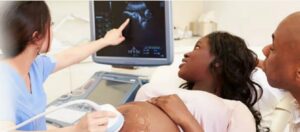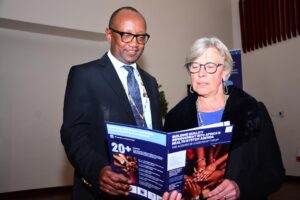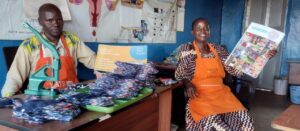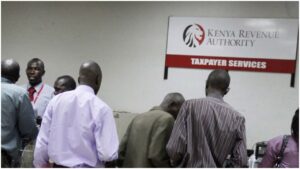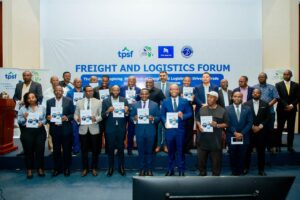The Untold Tales Of Differently Abled Expectant Women
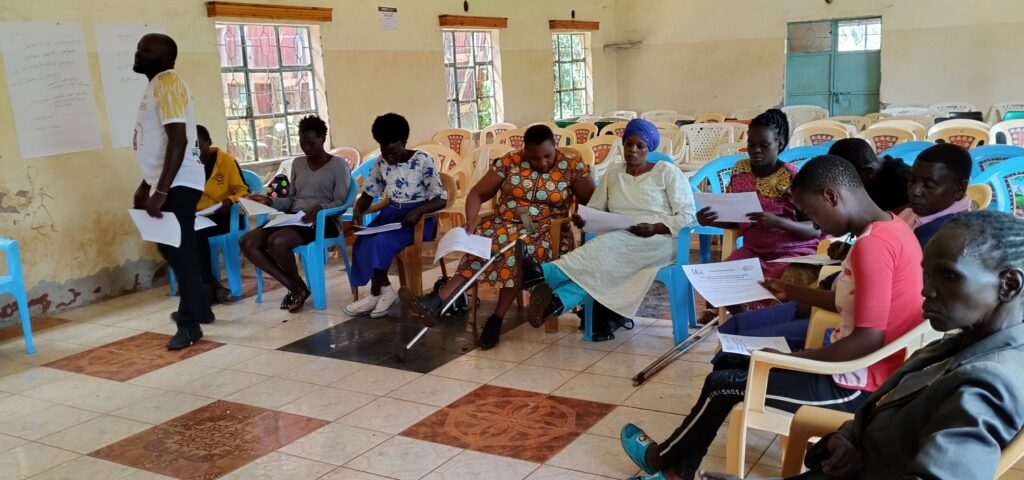
By Isabella Maua
It might sound sweet and warm to many, but the word mother seems to be a two-sided sword that evokes lingering and excruciating pain for teenage mothers and those living with disabilities in the Sub County of Mt. Elgon, Bungoma County.
Could it be because they are inhabitants of a remote, marginalized community, or is it because of their physical appearance that they have to pay such a high price to earn the most adorable title, ‘mother’’?
The price might come with unfathomable risks that have at times proven fatal, but thanks to the resilience and passion with which the victims (whom I choose to call champions and survivors) have had to overcome all the hurdles.
Emily Chesebe is a 48-year-old woman from the village of Nomorio and has been living with disability since birth. She narrated to The Times Newspaper how she lost her baby while seeking antenatal health care at one of the few public hospitals in her vicinity.
“Like any other mother, I had visited the hospital for examination and advice regarding my pregnancy because I was feeling uneasy and was experiencing untold pain. The doctors were so ruthless with me and were rushing me from one room to another mercilessly; in the process, I fell down, and that’s how my unborn baby’s life was suddenly but painfully ended,” explained Chesebe while trying to hold back her tears.
Nancy Cherop is a 21-year-old mother of one from Kapsokwony who lives with physical disability. She recounts her horrific incident during one of her visits to seek antenatal care at one of the Sub County hospitals while she was about to deliver.
“Being an expectant teenager living with disability was like a curse that had befallen me; the nurses gave me disgusting glances, and one asked me how on earth I could even get pregnant in my condition,” she recalled.
From that fateful day on, Nancy vowed never to step foot at any hospital not even during her labour and childbirth.
She divulged: I went back home after reluctantly being attended to, but I could never go back to any hospital to undergo such humiliation again. When my date was due, I gave birth at our home and later got help from a traditional birth attendant.”
Annet Ndiema, a 30-year-old mother from Kibuk also living with disability (by the virtue that she was involved in a road accident and lost her limbs), seems not to have taken off her mind the heart-breaking incident where doctors and nurses abandoned her on her way to the delivery room.
“While heading to the delivery room without my artificial limbs in place since they had been removed at the moment, I really needed assistance but I was aghast when all the nurses literally ran away from me as though they had seen a ghost,” recounted Ndiema, her body spasms evidently seen.
Ann Chefuna is a 41-year-old mother of one living with disability, but she spends most of her time at her small shop, where she sells cosmetics and foodstuffs.
“While expecting my daughter, I encountered a lot of challenges, from the bed I was admitted to the toilets and even stairs to the labor ward,” highlighted Chefuna.
Her situation reflects that of many other women who have unfortunately lost their children or even miscarried because of the lack of PWD-friendly structures in hospitals where they had gone to seek services.
Another problem experienced by women living with disabilities while seeking to bring forth their new-borns is the lack of inclusive services at many medical facilities.
Gloria is a 21-year-old woman from Kapsokwony who has lived with deafness since birth. She reveals that her experiences at most of the medical facilities she has visited to seek contraception and other related services within her vicinity has been a rough road to tread.
“I can only understand sign language, which sadly has no interpreters in the hospitals around, so it becomes very difficult to communicate and get the services I need,” cited Gloria with discontentment.
She, however, chuckles with her eyes glistering with hope when her sister (who is now the interpreter during our interview) asks her how she would feel when hospitals employed sign language interpreters.
“That would be the best thing to ever happen because I would no longer have to wait for you to take me to the hospital so that you can tell the doctors how I am feeling,” she smiled gleefully.
A walk around some of the medical facilities within the Mt. Elgon region could clearly depict the untold agony of women living with disabilities and seeking maternity services.
A chit chat with one of the nurses at Mt. Elgon Sub County Hospital (which is a level 4 hospital and the most relied on across the region) revealed that not many mothers living with disabilities visited the facility for maternal care.
According to Francis, one of the longest-serving nurses here, only three physically challenged women visited the facility for antenatal care and three with hearing impairments in the year 2023.
“Of the three expectant mothers who came to our clinic, only one came for delivery later on; I cannot tell where the rest sought delivery services, but we still had difficulties since we had to seek extra manpower to hold her limbs since we lack straps that could aid in such situations,” observed one of the nurses.
She added: “We, however, had a great challenge for those with hearing impairments, except for one of them who came alongside her sister, who assisted in translation while seeking family planning services.”
She also cited that the other one could read and write making their communication easier through pen and paper.
On many occasions, as explained by one of the nurses, a mother with physical challenges, especially those using artificial limbs, may lose their new-born at birth if there is no adequate manpower to lift them onto the delivery beds and even hold their limbs in the right position.
“It may be disheartening if we receive such a case when we only have one or two attendants around, and that is when we are forced to refer the patient to Bungoma or Webuye hospitals since the child’s life is at risk,” she expounded.
In some cases, the mother would have given birth but needs monitoring by the doctors and nurses and would be advised to stay at the facility for a day or two; however, the bathrooms and toilets aren’t PWD friendly.
“The toilets we have here do not support mothers living with disabilities at all; it is our request to the government and relevant authorities to look into this matter since we serve a large population from Trans Nzoia and Bungoma counties,” said one of the nurses.
According to Population Council report on Keeping Motherhood Safe, an estimated 343,000 women worldwide died from pregnancy-related complications in 2008.
Though disheartening, it is key to note that 50 percent of all maternal deaths occurred in six countries, including India, Nigeria, Pakistan, Afghanistan, Ethiopia, and the Democratic Republic of the Congo.
To confirm the rate at which PWD-related cases have been neglected, the Bungoma County Health Department could not account for any related data.
“It is unfortunate that we cannot account for this data since we don’t have a tool that reports the disability indicator regarding maternal mortality,” noted Getrude Wanyonyi, Bungoma County Reproductive Health Coordinator.
In a 2018 report on the maternal mortality of women and girls with disabilities by Women Enabled International, there was an attitudinal barrier among medical practitioners, exacerbating the situation for girls and expectant women with disabilities.
“In a 2005 academic study, 40 to 50% of gynaecologists felt unprepared to treat adolescents with disabilities, exposing them to humanitarian emergencies,’ the report stated.
The World Health Organization estimates that between 88 and 98 percent of maternal deaths are preventable.
“Although maternal mortality has fallen by almost 50% since 1990, developing regions face significant challenges meeting their commitment under the Sustainable Development Goals to reduce the global mortality rate ratio to less than 70 per 100,000 live births by 2030,” cited the WHO report.
What is disheartening is that, in this context, women with disabilities are inevitably prone to maternal mortality because they face increased barriers to accessing maternal health services.
Disability, as has always been said, is not inability; they, like any other person, deserve the best service, especially when they are bringing forth a new generation. The government, under the Ministry of Health, and even well-wishers remain the only hope to rewrite this narrative.

